The Choir 1935- 1985
Alun Howells recalls the story of the Choir
from its inception to its Golden Jubilee year
A brief examination of the headlines of the national papers in Easter week 1935 would reveal stories dominated by a massive earthquake in Formosa and preparations for the forthcoming Royal Jubilee. The local Swansea paper told of a visit of soprano Elizabeth Schumann to the new Brangwyn hall in a concert with the Swansea and District Male Choir. At the same time further up the Tawe Valley, the Morriston Orpheus Choir was born with Ivor E Sims its founder conductor.
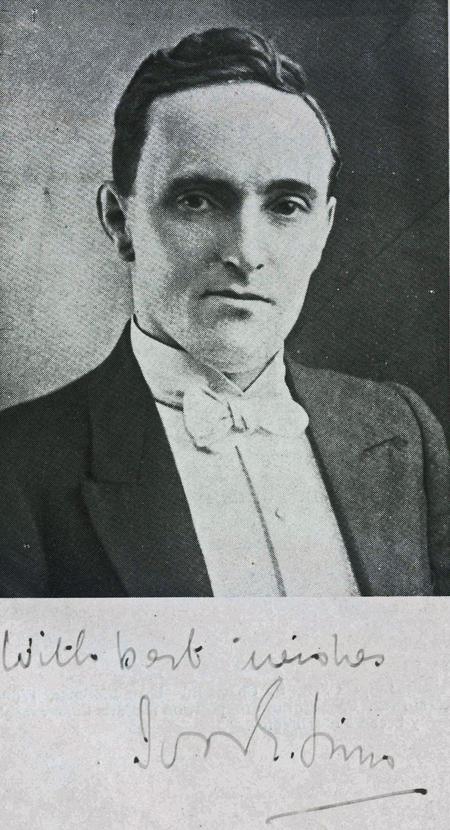
It is possible, however to trace the history of the Choir back to 1893, the Choir being known as the Morriston Male Choir which flourished until 1914. Since 1918 there has been an unbroken tradition of male choral singing in Morriston, initially with the founding by Mr. John Davies of the Gwalia Choir which become eminent in the competitive field. By 1924 the Gwalia’s name had been changed to Morriston United. Ivor Sims had acted as an accompanist with the choir and by 1926 had become its acknowledged conductor, remaining in post until 1934 when the choir became divided on the question of whether to popularise its repertoire, thereby increasing its revenue, or to concentrate on widening its audiences’ horizons in the field of classical music. A referendum of the whole choir took place. Voting was seventy to thirty in favour of the first alternative and Mr. Sims resigned, along with his thirty supporters, who at his request, re-joined the Morriston United Choir.
In 1935 however, members of the group persuaded Mr Sims of the need for another choir and the Morriston Orpheus was formed with a membership of around 50 on 23rd April 1935 at a rehearsal held at the Wesleyan vestry, Morriston.
In the years immediately following its formation the Choir concentrated primarily on competitions and local concerts. Success followed with the National Eisteddfod at Machynlleth in 1937.
During the Second World War rehearsals and concerts continued without interruptions, even during the blitz on Swansea. It was however, post war that the Orpheus entered its most eminent period. While still competing and winning the ‘National’ in 1947,48,49,44 and 1960, the Choir became closely linked with the development of choral music on radio and gramophone record. It was one of the regular choirs on the popular weekly radio programme ‘Welsh Rarebit’ produced by Mair Jones and featuring the young Harry Secombe as well as ‘Tommy Trouble’. It was also one of the first choirs to record for EMI on its Columbia label. Among the first recordings was the famous ‘Myfanwy’ complete with a barking dog between the two verses!
The Morriston United Choir had by this time disbanded and its members had joined the Orpheus to created musical harmony in Morriston. In 1956 the Choir was honoured with an invitation to sing at the Royal Command performance in the London Palladium. The show was given in 1957 due to the 1956 Suez crisis. Here is a photo from the press of the 1957 performance
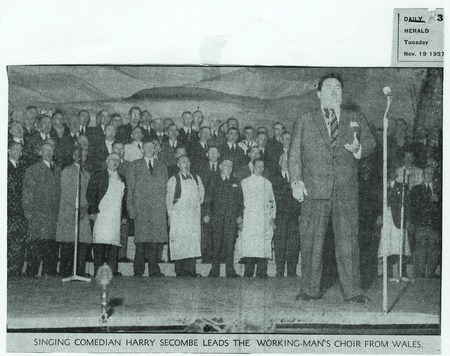
The post war Orpheus, under Ivor Sims, developed a reputation for rich tone and delicacy of singing, as evidenced in the performances of ‘When Evening’s Twilight’,
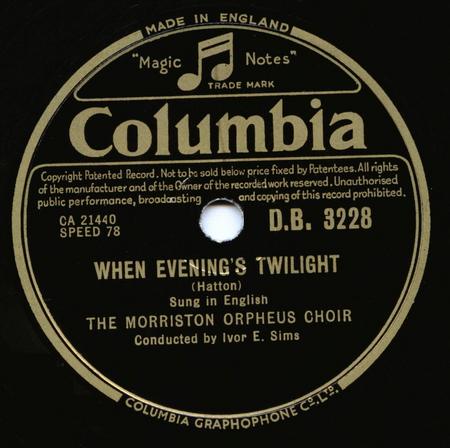
- Playlist item
‘Diniweidrwydd’ and ‘Y Delyn Aur’. The Choir also introduced a more sophisticated repertoire to its audiences with performances of Cherubini’s ‘Mass in D’, Max Bruch’s ‘ Firthjof’, Brahms ‘Rinaldo’ and Schubert’s ‘Song of the spirits over the waters’, which marked Mr.Sims last appearance on the Eisteddfod platform in 1960. Mr. Sims untimely death in 1961 prevented plans for the local record company Qualiton to record the Cherubini Requiem.
Following Mr. Sims death, Eufryn John took over. Mr. John had been the accompanist and during the next nine years the Choir concentrated on recording for EMI producing on average one LP per year.
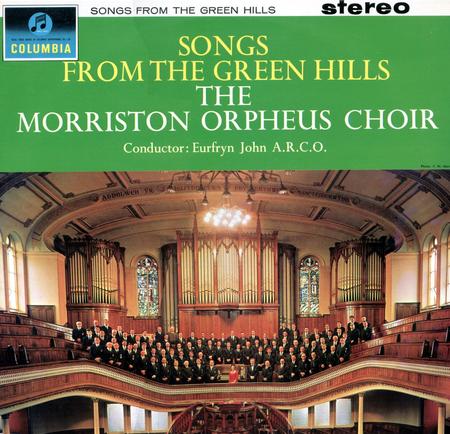
The first overseas tour took place to Ireland and to Germany. In 1963 Nazareth Chapel, which was the home of the Gwalia Choir, was purchased with funds obtained by donations from Morriston people, and converted into the home for the Orpheus and called the Ivor E Sims Memorial Hall.
In 1969 Lyn Harry took over and the trend of records and tours was continued but on a wider scale. The Choir had its first experience of recording with brass and military bands
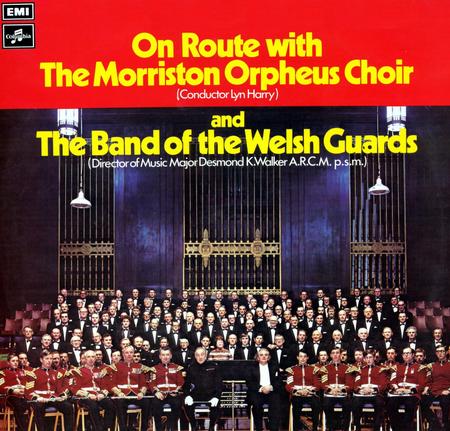
and also toured the USA and Canada on two occasions – 1973 and 1975.
When Mr Harry emigrated to Canada he was replaced by a much younger conductor, Mr. Leslie Ryan. Mr Ryan expanded the repertoire further and also wrote the first original piece specifically composed for the Choir - ‘Sing We Merrily’, published by Novello and recorded by EMI.
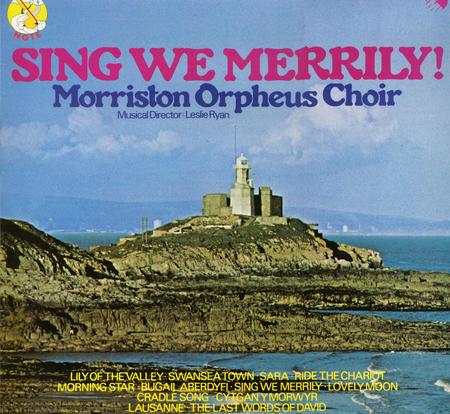
Mr. Ryan’s first LP with the Choir –A Grand Night For Singing, with the Band of HM Royal Marines marked a new phase in the history of the Choir. This LP has been digitally remastered and was reissued in 2009 due to its continued popularity. This period as well as seeing the commencement of the continuing relationship with the Band of HM Royal Marines also saw a completely new venture in the Choir’s participation in the Berlin Military Tattoo of 1977.
In 1979 Alwyn Humphreys was appointed as Musical Director, the first North Walian to hold the post. His term of office saw further horizons with more overseas tours. The LP Say It With Music continued the association of the Choir with the Band of HM Royal Marines: released in 1980, directed by Alwyn Humphreys
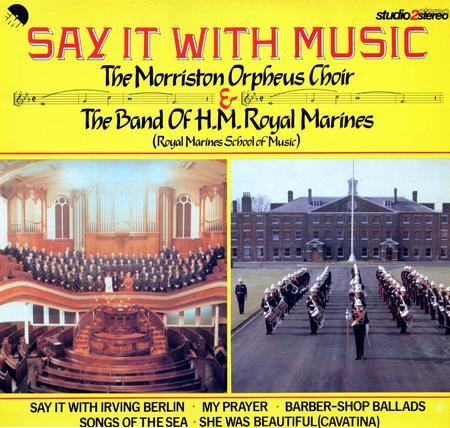
In 1981 the Choir was honoured to appear in Hyde Park at the Royal Fireworks Display to mark the occasion of Prince Charles marriage to Diana.
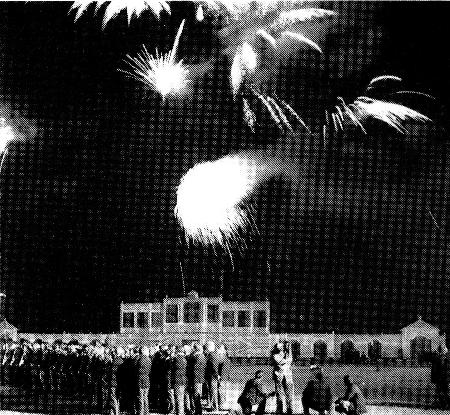
Soon after this the Choir sang at Cardiff Airport to welcome Pope John Paul to Wales.
Throughout its history the Choir has retained its strong Welsh non-conformist roots and its spiritual home has been Tabernacle Chapel in Morriston. It is here that its true successes have been celebrated in concerts and recordings.
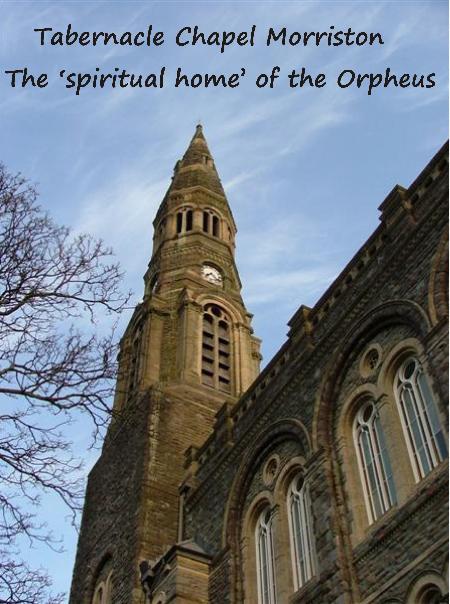
Written by Alun Howells (2nd bass) for the souvenir programme of the 1985 Annual Gala Concert.






